Mozambique: District Permanent Secretary questioned for embezzlement - AIM | Watch
Mozambique: Under pressure, insurgents disperse & dig in – By Joseph Hanlon

Image: Google Maps
In this issue:
Cabo Delgado war
- Insurgents disperse, create new forest base
- Demonstration in Macomia against soldiers
- Frelimo fights an old battle
- Amarula hotel siege – more details
Other news
- Tonela: exploit gas and other resources
- Stranded assets?
- New secret police heads
- Under pressure, insurgents disperse, create new forest base
As predicted, insurgents under pressure from solders from Rwandan and the SADC Mission in Mozambique (SAMIM) are moving to ignored and less protected areas. Insurgents attacked three villages near Bilibiza, in Quissanga district, on 31 May, in the first attack in nine months. Zitamar (2 June) says information on the attacks is difficult to obtain because “locals fear being caught speaking on the telephone as defence forces suspect them of communication with insurgents.” Six armoured cars were sent to Bilibiza from Macomia, 90 km north, and are being followed by other military vehicles, reports Noticias de Defesa (3 June)
At least 100 insurgents have recently moved to set up a new central base in dense forests of Meluco district, according to Pinnacle News (3 June), citing illegal artisanal miners and loggers who operate in the forests. Zitamar (3 June) says that “There have also been persistent rumours of battle-hardened reinforcements joining the insurgency in Cabo Delgado from Democratic Republic of Congo and other countries in East Africa” and that “Pinnacle’s report suggests that the recent wave of insurgent surrenders might represent a clear-out of less effective personnel from the insurgency, rather than a sign of weakness.” There have been a series of attacks in Meluco, including attacking power lines (Noticias 2 June)
And the director of a primary school in Mandimba, Niassa, has been detained by police and accused of leading a group which attacked two administrative posts on 22 and 26 May, Mirza Maguanda, Niassa police spokesperson said. (Carta de Moçambique, 2 June)
Attacks also continue in Nangade district, next to Palma and the Rovuma river bordering Tanzania, despite the presence of SAMIM troops with dead and captured people. (Lusa 31 May, 2 June) Other groups have moved to isolated parts of Mueda district, where groups of armed men have been seen recently. (Pinnacle News 3 June)
All of this points to insurgents moving north, south and west, having been pushed out of the key gas provinces of Palma and Mocimboa da Praia by Rwandan soldiers and police. Some have moved north to Nangade and south to Macomia districts, where fighting continues. Others have moved west, to remote parts of Mueda and into Niassa province, southwest to Meluco, and south to Quissanga where there is not a large military presence and it is easy to hide. Finally, some have gone to ground in Palma where there have been attacks.
Comment: Missed opportunity.
Quissanga is the southernmost district affected by the war, and it was largely recaptured by the Mozambican army and police a year ago, but with Quissanga town and Bilibiza largely destroyed. It is just 100 km from Pemba on a good road and only 70 km from Metuge, where tens of thousands of displaced people are crowded into camps. In the past year, it could have become a model of reconstruction. Hundreds of young displaced people could have been given jobs and training rebuilding those towns. Services could have been restored. The army could have shown that it could protect those towns. It could have become a beacon for young people, showing an alternative to the insurgency. But the opportunity was missed. The district was left empty, and now it is the insurgents who are returning. jh
- Demonstration in Macomia against soldiers
Petty traders in Macomia town marched on the administration building on 1 June to protest against what they called “kidnapping” and “extortion” by soldiers. The group was made up of people selling telephone time, serving as agents for the MPesa electronic money system, stall holders, and sellers of various goods on the street. They said five traders had been taken by soldiers in May and three are still missing – a motorcycle taxi driver, an MPesa agent, and a street trader.
The march was triggered when an MPesa agent was taken on 31 May. During the march, he was released in the main market, and the march broke up. But three remain missing. Tension has continued between security forces and local people, because the security forces believe – probably correctly – that some local people support the insurgents, and they accuse the traders. (MediaFax 3 June)
Local people and Lusa (30 May) point to indiscipline within the security forces, and the recruitment of petty criminals into the military who continue their activity in uniform, unchecked. Tensions have been growing and local people compare indiscipline of local soldiers and police to the discipline of the Rwandan soldiers who are respected by local people.
Last week, the Mozambican national police command announced it would send inspectors of Macomia to investigate claims of torture of civilians.
Muslims targeted in Cabo Delgado, says US: Residents in Cabo Delgado “who because of their appearance were identified as Muslim continued to face risk of sometimes arbitrary detention by police and armed forces. Nongovernmental organizations (NGOs), news media outlets, and human rights organizations continued to strongly criticize the government’s response as exacerbating existing grievances among historically marginalized majority-Muslim populations,” says the US State Department in its 2021 Religious Freedom Report, issued on 2 June 2022.
Unemployment and lack of opportunity is major problem for dislocated young people too, provincial Youth and Employment Secretary Maria Carrilho was told by students at a talk in Pemba. And student pointed to unemployment and lack of opportunities as two reason why young people join the rebels. Various programmes were mentioned, but the students said they had never heard of them and could not find out how to apply. “I don’t know of any of the programmes that are supposed to exist for youth,” said Alberto Mane, a young man forced to move by the war and now at Escola Secundaria de Pemba. (Lusa 3 June)
Total deaths reached 4007 by 27 May, according to ACLED and Cabo Ligado (31 May).
The United States wants to expand its military training programme, ambassador Peter Vrooman said. (Noticias, 3 June)
- Comment: Frelimo fights an old battle
- Behind the murky frontline of the war in Cabo Delgado lie issues that date back 52 years
Joseph Hanlon, Financial Mail, 2 June 2022
In 1970, insurgents in the province of Cabo Delgado were gaining the upper hand, so the government in Portugal brought in thousands of soldiers in what was called Operation Gordian Knot. Most insurgent bases were destroyed, and the guerrillas were dispersed. The government declared victory, saying the insurgency was defeated.
Today the government of Mozambique, too, faces another insurgency in Cabo Delgado, and has brought in thousands of soldiers. They come from Rwanda, SA and 22 other countries. Again, the government is declaring the insurgency defeated, with bases destroyed and guerrillas dispersed.
But five decades ago the insurgents were members of the Frelimo liberation movement, and they eventually won the war. They were smashed in Cabo Delgado; but guerrillas are mobile. Frelimo opened a new front in Tete, to the south. … Frelimo’s new offensive moved to other provinces as well, while some guerrillas simply went to ground to wait for the time when Portugal could no longer afford a big army presence.
Frelimo was fighting against government oppression and for a fair share of the wealth of a rich province, but the government in Portugal denied this and said the war was directed by foreign communists. Today Frelimo is the government, and insurgents are fighting for a voice and a fair share of the wealth, but the Mozambican government denies this and says the war is directed by foreign Islamists.
And Frelimo has adopted the same strategy as Portugal did 52 years ago – Operation Gordian Knot Mark 2. But guerrillas are still mobile, in this case moving to Niassa, parts of Cabo Delgado not affected by the war, and are looking to open a front in Nampula to the south. Many insurgents have gone back to their families, often joining them in camps for people displaced by the war. They will return home with their families, and in this era of smartphones, wait for the call.
All civil wars draw outside actors. Portugal had the backing of the US, Nato and South Africa, and still lost. Frelimo did have backing from socialist and social democratic countries, though most importantly it had support from the people. But it was viewed through the lens of the Cold War.
Today Frelimo has the backing of the US, South Africa, Rwanda and now the former colonial power, Portugal. The insurgents have some support from Islamic State (IS) and perhaps from wealthy people in the Middle East. This time it is viewed through the lens of the war against militant Islam.
The Frelimo leadership still includes people who, as young men, fought against Operation Gordian Knot. Why do they think that this time the government, with a powerful armed force, can defeat guerrillas with a local base? Do they really believe that this new insurgency in Cabo Delgado has no local support?
Frelimo’s foreign backers are taking two contradictory positions.
On the one side, the US and IS may still be small players, but both want to escalate and turn Mozambique into a major proxy war between them. With no evidence, and with widespread rejection by Cabo Delgado researchers, the US in March 2021 labelled the insurgents as Isis-Mozambique and “global terrorists”.
In a further escalation, on April 4 this year the US named Mozambique as one of five countries under the Global Fragility Act, which means substantially increased US involvement in Mozambique to fight “Islamic terrorism”. IS responded by accepting the US label and began to call the insurgents “IS Mozambique”. Clearly, each wants to fight the other and do it in Mozambique.
The position on the other side is that of the development banks, the EU and most Mozambican researchers, who want to de-escalate the civil war by dealing with the grievances. The World Bank, the African Development Bank, the UN and the EU worked with a Mozambican government team to write the Resilience & Development Strategy (known as Erdin).
It says that “at the root of this insurgency are perceptions of inequality, exclusion and marginalisation [and] perceptions of injustice in the distribution of benefits and opportunities arising from extractive activities”. And it calls for more “inclusive and equitable access to public services” and for efforts to “strengthen inclusive governance, with a focus on citizen participation [and] fighting corruption”.
Because the grievances are set out so explicitly, Erdin has sat on the table for six months and was never submitted to the Mozambican council of ministers. As it gets closer to the September Frelimo party congress, President Filipe Nyusi is increasingly flying the flag of no grievance and a military solution. Can he make the colonial war plan work?
https://www.businesslive.co.za/fm/fm-fox/2022-06-02-in-cabo-delgado-frelimo-fights-an-old-battle/
“I’m Still Alive but Sh*t Is Getting Wild: Inside the Siege of the Amarula” by Alex Perry, Outlook, 1 June, The most detailed report I have seen of the March 2021 insurgent siege of the Amarula Hotel in Palma and the breakout of many of those inside, confirms many previous reports but adds substantial new information. But also particularly interesting because it is largely written from the perspective of expat workers who move from project to project across the world. This is not gas for local development, but a world of international companies, contractors, and workers. Perry also talks to many of the Mozambicans, and confirms stories of racism. But the unavoidable conclusion, writes Perry, “was that Total had the ability and resources to save people but didn’t.” He asks “Why did Total behave so badly and so shamelessly? The excruciating answer seems to be: because it could count on you and me [to] fill our cars or heat our homes or switch on a light” to sustain a trade in energy the sees the killing of people in the Amarula, and the war in Cabo Delgado, “not as dangers to prevent or mitigate but as inevitabilities to navigate.” But Perry ends his article with a quote from Ceu in South Africa, the young son of Adi, one of those killed: “The thing is, I understand. I feel some sympathy. If I were in their place, and I couldn’t even afford to feed my children, I might actually do the same.”
Natural resources
- Tonela: exploit gas and other resources cleanly and transparently using private sector
“The exploitation of the country’s natural resources should be done transparently so that its benefits contribute, first and foremost, to improving the lives of Mozambicans, today and tomorrow,” said Max Tonela, Minister of Economy and Finance. This will be done through greater participation of the national and foreign private sectors in the exploitation of energy resources.
“”Mozambique’s commitment to the climate agenda is unequivocal. We pay attention to the development of renewable sources, for the diversification of the national energy matrix and to achieve the goals of universal access to electricity,” emphasised the Minister. The gas will be fully exploited because it is important for Mozambican development, but also as a less damaging fossil fuel which is essential for the energy transition. “Natural gas presents itself as the alternative that will ensure baseload energy for the energy transition”, he said.
Tonela was speaking at the Mozambique Mining, Oil & Gas and Energy Conference on 2 June.
“An evaporating case for gas: why does SA keep investing in it?“ by Susan Comrie, Daily Maverick, 27 May says exactly the opposite, and the gas will be wasted investment as the demand for gas will be lower than the industry says. The argument is supported by “Stranded fossil-fuel assets translate to major losses for investors in advanced economies“ in Nature Climate Change (26 May) which estimates “that global stranded assets as present value of future lost profits in the upstream oil and gas sector exceed $1 trillion under plausible changes in expectations about the effects of climate policy.” [To read / download the study, please click HERE]
Other News
- New secret police heads
The two top men in SISE (Information and State Security Service, Serviço de Informações e Segurança do Estado) were replaced by President Filipe Nyusi on 31 May. Bernardo Lidimba is the new director, replacing Júlio dos Santos Jane, and Deputy Director is Joia Haquirene.
The security services have to be close to the president, and Lidimba is. He was the President’s head of protocol (a much more important post than the name implies) 2016-8 and then ambassador to Kenya until last year. Joia Haquirene has been a member of the secret services since 1978, and held positions including National Director of Counter-Intelligence.
The $2 bn secret debt was run through SISE and Haquirene was deeply involved. He was head of the SISE investment company GIPS which in turn was owner of secret debt companies Ematum and Proindicus. He told the secret debt trial that he signed cheques for the companies even though he did not know what the companies did, or that GIPS, the company he set up and supposedly led, was a shareholder in them. As Zitamar (2 June) commented, “Haquirene’s claim to have been unaware of the offshore security project stretches credulity to breaking point. If he really was unaware, he shouldn’t be anywhere near an organisation with ‘intelligence’ in the title, let alone the deputy head of it.”
But the key point is clearly his loyalty to Nyusi. His testimony to the secret debt trial pinned the blame on former president Armando Guebuza and those around him.
120,000 tons of maize from the last harvest has not yet been sold in Niassa, due to lack of demand, low prices, and poor quality, reported the provincial director of Industry and Commerce in Niassa, Fidel Salamandane. (Rádio Moçambique 3 June) Yet again, the lack of a guaranteed market and flood price sehas put all the risk on peasant farmers.
Tete miners strike; 70 police sent in. Miners are striking against Vulcan, the company owned by Jidal of India which took over the coal mine from Vale. They are demanding a salary increase and that Vulcan clean up some of the mess left behind by Vale. Vulcan has refused and says it will produce during the strike.
3000 Ilha de Moçambique residents will be forced to leave, according to district administrator Momade Ali. Long-term residents of Mecuti are squeezed into a small area and poor housing conditions, and this has led to conflicts between residents and tourists disagreeing over whose island it is. Should it be seen as a historic and tourist zone, or is it primarily the island of the families who have lived there for generations? The need to repair damage caused by Cyclone Gombe and upgrade the remaining housing is given as the reason to displace 3000 residents to the mainland. (Lusa 30 May) Despite the poor living conditions, they seem unlikely to go without a fight.
53 tonnes of illegally mined semi-precious stones were found in two lorries in Nampula in April and May. The consisted of tourmaline, garnet, quartz and beryl with false documentation which were destined for China. (Lusa 16 May)
A manganese mine has opened in Changara, Tete and hopes to export 50,000 tonnes of ore per month to India, China and Thailand. (Radio Moçambique, 24 May) Manganese demand is expected to grow because it is used in batteries for electric cars, and it continues its traditional uses in iron and streel production.
By Joseph Hanlon


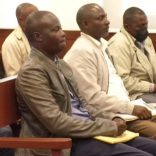
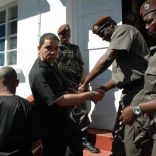

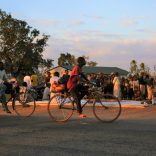
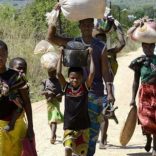
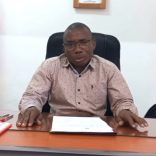




Leave a Reply
Be the First to Comment!
You must be logged in to post a comment.
You must be logged in to post a comment.